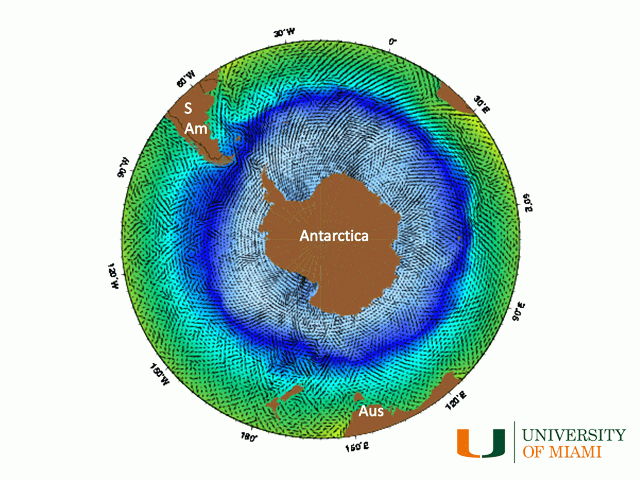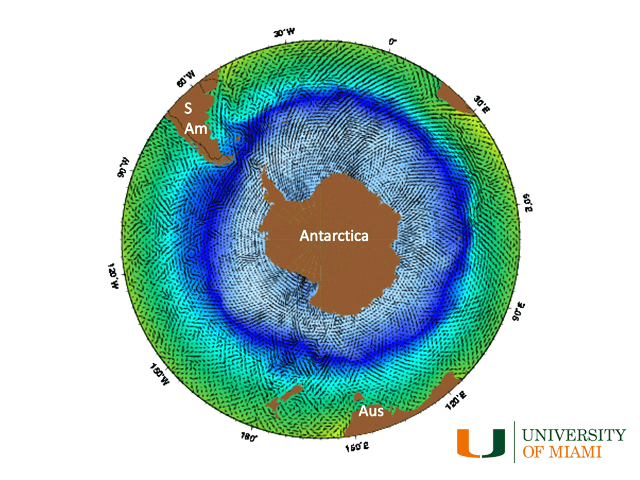Ag Weather Forum
Warming Revs Up World's Strongest Current
New research recently published in the science journal Nature Climate Change concludes that the only ocean current that flows completely around the world, the Antarctic Circumpolar Current (ACC), is getting faster, mostly because of rising ocean temperatures.
And those rising ocean temperatures are most likely due to human-influenced climate warming. Study authors are oceanography professors Jia-Rui Shi, Lynne D. Talley, Shang-Pang Xie, and Qihua Pang of the Scripps Institution of Oceanography at the University of California San Diego; and oceanography professor Wei Liu at University of California Riverside.
The ACC is an important divider between cold air around the South Pole and more temperate conditions farther north. The winds in the ACC latitude have a long-standing nickname of the "Roaring Forties" in ocean transportation history because of their consistent velocity; after all, there's no land barrier to break them up. World sailing contests still use the ACC region for their competitions.
What's happening, according to the study, is that the already-strong winds in the Antarctic Circumpolar Current are showing "robust acceleration of zonally averaged Southern Ocean zonal flow at 48 degrees South to 58 degrees South (latitude). This acceleration is reproduced in a hierarchy of climate models, including an ocean-eddy-resolving model. Anthropogenic (human activity related) ocean warming is the dominant driver, as large (small) heat gain in the downwelling (upwelling) regime north (south) of the Subantarctic Front (SAF) causes zonal acceleration on the northern flank of the ACC and adjacent subtropics due to increased baroclinicity." In layperson terms, the winds are getting stronger and computer modeling of these stronger winds shows that warming related to human activity is the source of these stronger winds. The Nature Climate Change abstract goes on to say, "Continued ocean warming could further accelerate Southern Ocean zonal flow."
P[L1] D[0x0] M[300x250] OOP[F] ADUNIT[] T[]
The article cites the advancement in data gathering from such recent technological devices as more detailed satellite imagery analysis along with the deployment of the Argo float--remote-sensing buoys which are capable of diving to great depths to gather more information in the oceans around the world than has been acquired before.
Follow-up impact of the faster currents is still being studied. However, oceanographers believe the faster currents will alter the heat distribution in the ocean and affect marine life that receives mostly warmer waters. Faster circulation will also change how seawater nutrients are carried in oceans around the world.
There's a carbon dioxide angle as well. An article in The Hill noted that researchers earlier this year found that the Antarctic Circumpolar Current had a period of higher velocity during the last interglacial period between 115,000 and 130,000 years ago. Findings of that research indicate that the faster ACC "likely caused massive weather disruptions and lowered the ocean's ability to absorb carbon dioxide."
Another summary article on the ACC research done by the New York Times noted the stronger circumpolar winds are resulting in stronger upwelling of deep ocean water. That deep water has locked away carbon for a long time -- measured in centuries. When that water is forced upward, it could release more carbon dioxide into the atmosphere.
One more general effect of warming that is unrelated to the circumpolar wind specifically: The ocean around Antarctica is getting warmer in general, which has been found to be melting the Antarctic ice shelves from underneath. That is adding to sea level rise.
There is not a direct connection between the warming-induced increased velocity of the Antarctic Circumpolar Current and U.S. agriculture region weather. However, the research findings cited point to the fact that, just as increased world warming is affecting climate conditions in the far north, it is also affecting climate conditions in the far south.
The full abstract of the Nature Climate Change article, with additional references, is at this link: https://www.nature.com/…
Bryce Anderson can be reached at Bryce.anderson@dtn.com
Follow him on Twitter @BAndersonDTN
(c) Copyright 2021 DTN, LLC. All rights reserved.






Comments
To comment, please Log In or Join our Community .